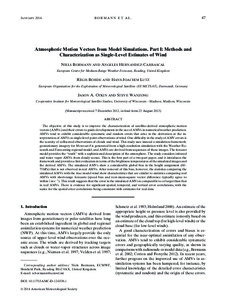Por favor, use este identificador para citar o enlazar este ítem:
http://hdl.handle.net/20.500.11765/1591
Atmospheric motion vectors from model simulations. Part I: Methods and characterization as single-level estimates of wind
| Título : | Atmospheric motion vectors from model simulations. Part I: Methods and characterization as single-level estimates of wind |
| Autor : | Bormann, Niels; Hernández Carrascal, Ángeles |
| Palabras clave : | Cloud tracking; Cloud motion winds; Satellite observations; Data assimilation |
| Fecha de publicación : | 2014 |
| Editor: | American Meteorological Society |
| Citación : | Journal of Applied Meteorology and Climatology. 2014, 53(1), p. 47-53 |
| Versión del editor: | http://dx.doi.org/10.1175/JAMC-D-12-0336.1 |
| Resumen : | The objective of this study is to improve the characterization of satellite-derived atmospheric motion vectors (AMVs) and their errors to guide developments in the use of AMVs in numerical weather prediction. AMVs tend to exhibit considerable systematic and random errors that arise in the derivation or the interpretation of AMVs as single-level point observations of wind. One difficulty in the study of AMV errors is the scarcity of collocated observations of clouds and wind. This study uses instead a simulation framework: geostationary imagery for Meteosat-8 is generated from a high-resolution simulation with the Weather Research and Forecasting regional model, and AMVs are derived from sequences of these images. The forecast model provides the “truth” with a sophisticated description of the atmosphere. The study considers infrared and water vapor AMVs from cloudy scenes. This is the first part of a two-part paper, and it introduces the framework and provides a first evaluation in terms of the brightness temperatures of the simulated images and the derived AMVs. The simulated AMVs show a considerable global bias in the height assignment (60–75 hPa) that is not observed in real AMVs. After removal of this bias, however, the statistics comparing the simulated AMVs with the true model wind show characteristics that are similar to statistics comparing real AMVs with short-range forecasts (speed bias and root-mean-square vector difference typically agree to within 1 m s−1). This result suggests that the error in the simulated AMVs is comparable to or larger than that in real AMVs. There is evidence for significant spatial, temporal, and vertical error correlations, with the scales for the spatial error correlations being consistent with estimates for real data. |
| Patrocinador: | The study was funded by EUMETSAT Contract EUM/ CO/10/46000000785/RB. |
| URI : | http://hdl.handle.net/20.500.11765/1591 |
| ISSN : | 1558-8424 1558-8432 |
| Colecciones: | Artículos científicos 2010-2014 |
Ficheros en este ítem:
| Fichero | Descripción | Tamaño | Formato | ||
|---|---|---|---|---|---|
| 2014_JAMC-D-12-0336.pdf | 2,72 MB | Adobe PDF |  Visualizar/Abrir |
Los ítems de Arcimis están protegidos por una Licencia Creative Commons, salvo que se indique lo contrario.





